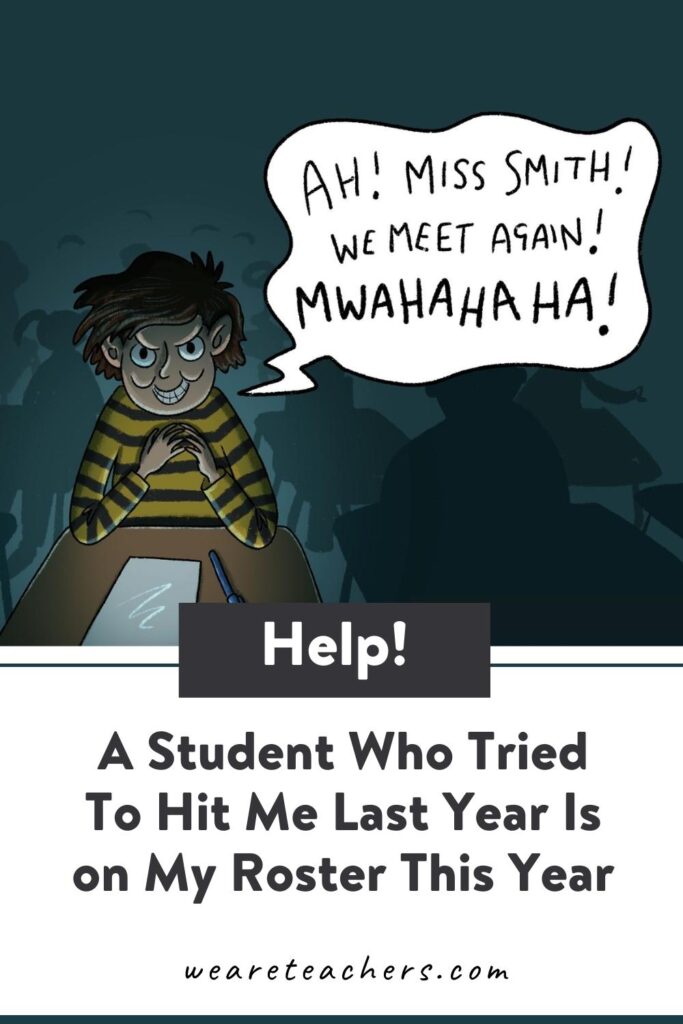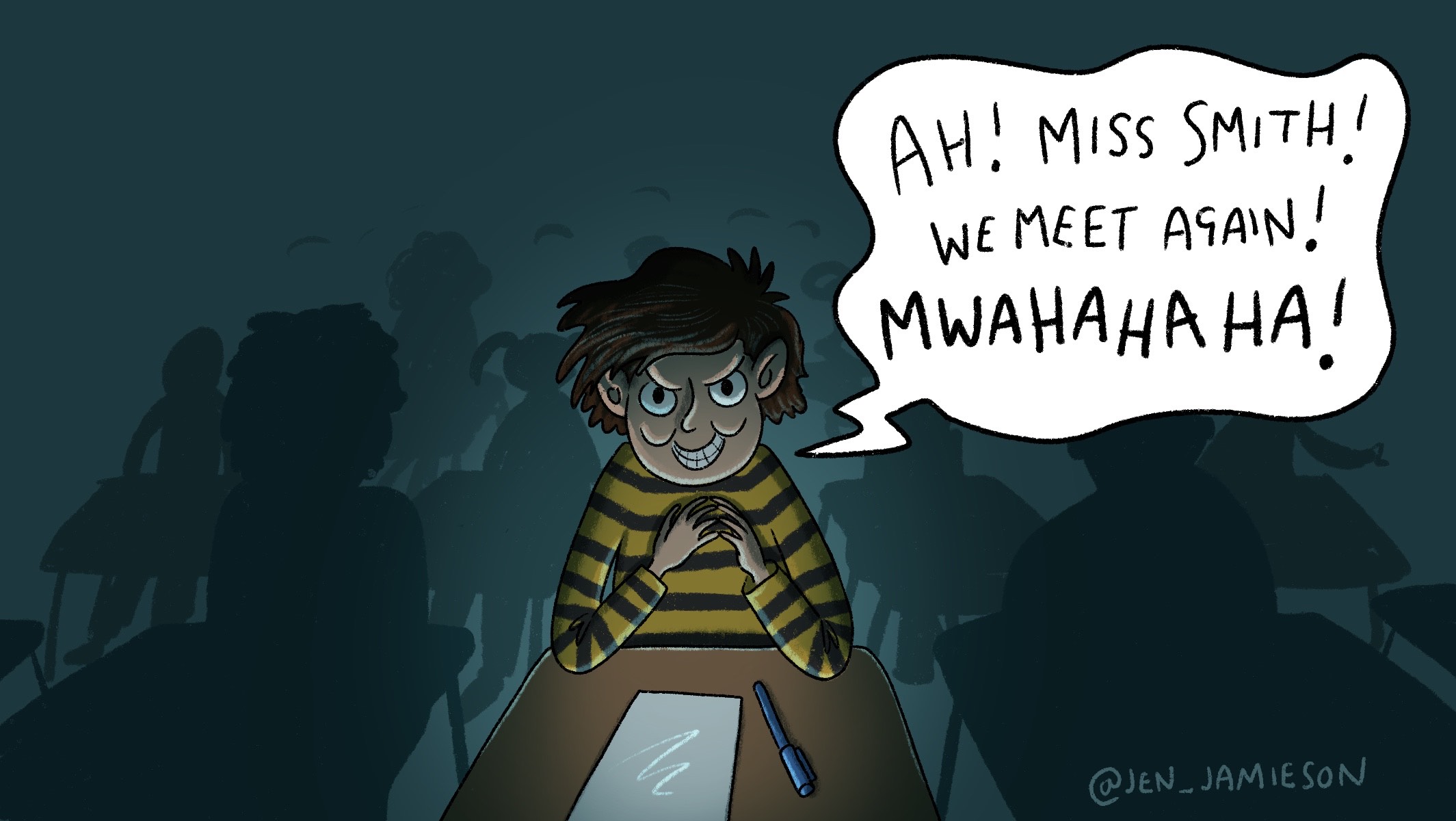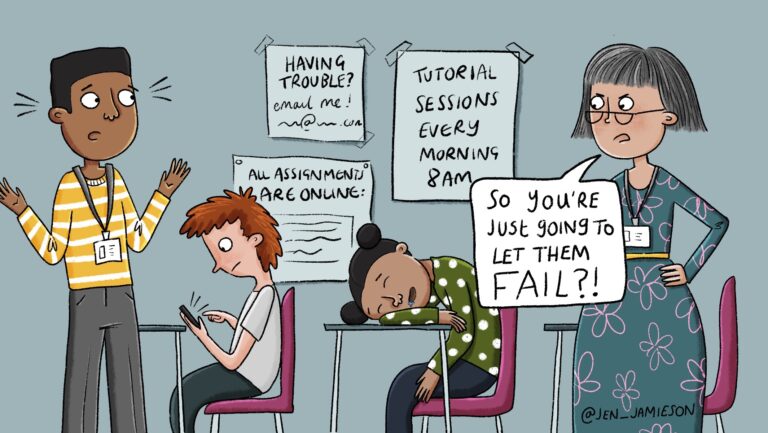Dear WeAreTeachers,
Last year while on cafeteria duty, I saw a 7th grader get up and leave without taking care of his tray. When I asked him to go back and take it to the cleaning area, he responded, “That’s not mine,” and kept walking. When I asked him again, he began shouting ethnic slurs and lunged at me. Luckily, an administrator saw what happened and intervened, but now I see this student is on my roster for 8th grade. I talked to the counselor about moving him to another class, but she said I should “try to give him a clean slate and see what happens.” I don’t feel like I should have to—am I just being stubborn? —Return to Sender
Dear R.T.S.,
I’m a proponent of clean slates. I am also a proponent of not weaponizing values for compliance.
It’s a reasonable expectation that teachers give students a clean slate for minor mistakes, rumors from other teachers, or other low-stakes situations. This is different. This was not an impulsive verbal reaction that a lot of teachers (unfortunately) hear in schools all the time. Plus, this was not a kindergartner. It was a 7th grader.
Most schools and districts have a policy around teachers being able to reassign students to other classes. In some places, it’s a percentage. In others, it’s a number. Most unions know this policy well.
Once you’ve figured out what the number is, email your counselor. Communicate that this is a student who tried to harm you for a simple redirection, and you would not feel safe given the potential for similar incidents in a classroom setting. Finally, express that he needs to be reassigned “as one of my five student reassignments I’m entitled to per district policy” so it’s clear you’re aware of your rights. It’s important for this to be in writing in case you need to refer back to it later.
I hope you get the protection you need. But I also hope this student gets the mental health support he needs to have meaningful relationships and more reliable emotional processing. That’s your counselor’s job to connect him with, though, not yours.
Dear WeAreTeachers,
Last year, I taught my first 9th grade study skills course, and students walked all over me knowing the course doesn’t count toward their GPA. Students often skipped class, didn’t turn in work, and never had any repercussions for failing. How do I demand more respect this year—for myself and for an important class I believe in? —Study Hall Is a Free-for-All
Dear S.H.I.A.F.F.A.,
I think this is a two-part issue.
First, you need more support from your administration. If there’s no incentive for kids to pass or even attend, what message is that sending students and families about the value of study skills?
Get your administrators’ help in drafting clear expectations and consequences to put on your syllabus. Make sure this includes consequences for failing the course. Even if it doesn’t affect their GPA, a missing requirement—even a pass/fail one—should affect their ability to graduate, right?
Once you have clear expectations from your administrators, communicate that with your classes at the beginning of the year. Then when boundaries are inevitably pushed—skipping, missing assignments, etc.—you can address them right then instead of waiting until things are out of control.
Finally, I’m sure you already do this, but high school kids in particular are very receptive to the “here is why you need this” explanations. Show them how they can use the Pomodoro technique to combat procrastination, or do an in-class demonstration of how exercising before studying helps improve memory and cognitive performance.
Dear WeAreTeachers,
One of the things I love best about summer is being able to exercise. I have the time and energy to take group classes, go on long runs or walks, or move along to a workout video on YouTube. But inevitably, once I go back to school, all exercise goes out the window. How do other teachers stick to any kind of routine with the demands of our job? —Let’s (Stay) Physical (Past August)
Dear L.S.P.P.A.,
I felt this question in my soul. Exercise was also one of my favorite parts of Teacher Summer. Pre-child, a good part of my daily summer routine involved a Les Mills Bodypump class at my local YMCA. Then I’d get one of their ice-cold blueberry smoothies, take it poolside, and read. (I love my child, but man, those summers were clutch.)
I never managed to stick with an exercise routine during the school year. Thus, I will not answer this question. (The back-to-school onslaught always destroyed any exercise momentum I’d built up.) But here’s some advice from teachers who’ve had success. I wish I’d had these tips!
“I lower my expectations. LOL!”
“Really though. I know I’m not going to be waking up at 4 a.m. to fit in a 45-minute spin class. I also know I won’t do anything after work. During the school year, I do a 10- or 15-minute HIIT workout in the garage before I jump in the shower. It’s enough to give me all the benefits of working out with minimum disruption to my schedule.” —Kacy P.
“I taught summer school one year specifically to buy a refurbished Peloton bike.”
“It’s been worth every penny to not have to leave my home to work out (especially in winter!). If I don’t have the energy to go hard, I just put on a TV show and pedal to get some movement in.” —Reagan A.
“I work exercise into my day during the school year.”
“During my lunch or conference period, I always take a walk. If it’s a crazy day, I go for a walk before heading home. I do planks when I have a few minutes to spare, and if I can’t take a walk one day, I’ll use my standing desk instead. The key for me is being gentle with myself. All movement counts!” —Meg M.
A lot of comments mentioned focusing on the benefits of how exercise makes you feel to stay motivated. Thinking about the endorphins and energy is always a better motivator than the shame of feeling like you “have” to stick to something.
Do you have a burning question? Email us at askweareteachers@weareteachers.com.
Dear WeAreTeachers,
Last year, my best teacher friend of over 10 years was selected to be our next principal. I thought I had reasonable expectations of what might change in our friendship, but it feels like she’s now keeping our entire friendship at arm’s length. She told me we can’t talk about work (at all—like not even why the A/C in the gym is broken). She also said we can’t hang out anywhere in public or pal around with each other at school because it’ll look like she has favorites. I get that her new job is important to her, but these boundaries seem unreasonable. Should I just accept that this is the end of our friendship?—So Long, Boss BFF

WeAreTeachers

